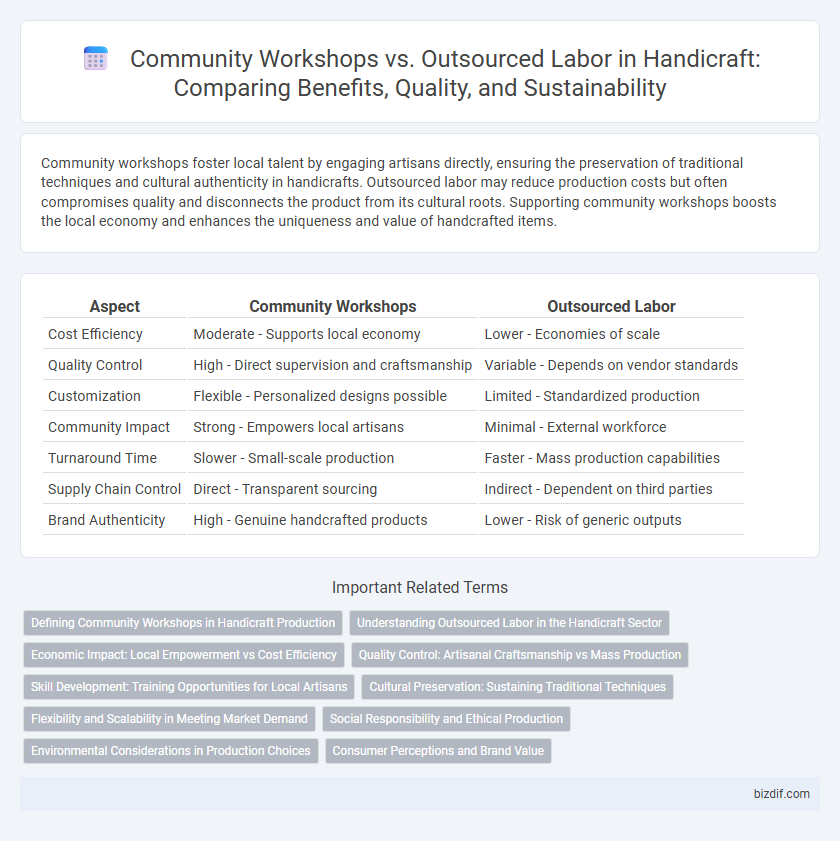Community workshops foster local talent by engaging artisans directly, ensuring the preservation of traditional techniques and cultural authenticity in handicrafts. Outsourced labor may reduce production costs but often compromises quality and disconnects the product from its cultural roots. Supporting community workshops boosts the local economy and enhances the uniqueness and value of handcrafted items.
Table of Comparison
| Aspect | Community Workshops | Outsourced Labor |
|---|---|---|
| Cost Efficiency | Moderate - Supports local economy | Lower - Economies of scale |
| Quality Control | High - Direct supervision and craftsmanship | Variable - Depends on vendor standards |
| Customization | Flexible - Personalized designs possible | Limited - Standardized production |
| Community Impact | Strong - Empowers local artisans | Minimal - External workforce |
| Turnaround Time | Slower - Small-scale production | Faster - Mass production capabilities |
| Supply Chain Control | Direct - Transparent sourcing | Indirect - Dependent on third parties |
| Brand Authenticity | High - Genuine handcrafted products | Lower - Risk of generic outputs |
Defining Community Workshops in Handicraft Production
Community workshops in handicraft production serve as collaborative spaces where local artisans share skills, tools, and resources to create handmade products. These workshops emphasize cultural heritage and sustainable practices by fostering direct artisan involvement and maintaining traditional techniques. Unlike outsourced labor, community workshops support local economies and preserve the authenticity of craft through collective craftsmanship.
Understanding Outsourced Labor in the Handicraft Sector
Outsourced labor in the handicraft sector involves hiring external artisans or factories to produce goods, often to scale production and reduce costs. This approach can compromise the authenticity and quality associated with handcrafted items, impacting traditional techniques and local economies. Understanding the balance between outsourcing and preserving craftsmanship is essential for sustaining cultural heritage while meeting market demands.
Economic Impact: Local Empowerment vs Cost Efficiency
Community workshops foster local empowerment by creating jobs, supporting artisanal skills, and circulating income within the region, which boosts economic resilience and preserves cultural heritage. Outsourced labor often prioritizes cost efficiency by minimizing production expenses through lower wages and larger scale outputs, but it may lead to reduced local employment opportunities and economic leakage. Balancing both approaches requires evaluating long-term socio-economic benefits of community workshops against the short-term financial gains of outsourcing.
Quality Control: Artisanal Craftsmanship vs Mass Production
Community workshops foster artisanal craftsmanship through hands-on quality control, ensuring each piece reflects unique skill and cultural heritage. Outsourced labor often relies on mass production techniques, which can compromise the intricate details and authenticity of handmade items. Emphasizing local artisans maintains superior craftsmanship standards that mass-produced goods typically lack.
Skill Development: Training Opportunities for Local Artisans
Community workshops provide hands-on training opportunities that enhance local artisans' craftsmanship, preserving traditional techniques and fostering innovation. These workshops create a collaborative environment where skills are continuously refined, empowering artisans to produce high-quality, culturally rich handicrafts. Outsourced labor often lacks this developmental focus, limiting skill growth and reducing the authenticity and uniqueness of the handmade products.
Cultural Preservation: Sustaining Traditional Techniques
Community workshops play a crucial role in sustaining traditional handicraft techniques by enabling direct knowledge transfer between artisans and younger generations, preserving cultural heritage within local contexts. Outsourced labor, often detached from original cultural settings, risks diluting authentic craftsmanship and undermining the continuity of time-honored skills. Investing in community-based craftsmanship fosters cultural preservation and empowers artisans to maintain the integrity of their traditional art forms.
Flexibility and Scalability in Meeting Market Demand
Community workshops offer unparalleled flexibility by enabling artisans to quickly adapt designs and techniques in response to shifting market trends, fostering innovation and authenticity. Outsourced labor provides scalability through access to larger production capacities, but often sacrifices customization and swift adjustments. Balancing these approaches allows businesses to optimize responsiveness and volume, ensuring efficient fulfillment of diverse consumer demands in the handicraft industry.
Social Responsibility and Ethical Production
Community workshops foster social responsibility by empowering local artisans, preserving traditional craftsmanship, and ensuring fair wages in the handicraft industry. Outsourced labor often risks exploitative conditions and undermines ethical production standards by prioritizing cost-cutting over workers' well-being. Supporting community-based production aligns with sustainable practices and enhances transparency in supply chains.
Environmental Considerations in Production Choices
Community workshops prioritize sustainable practices by utilizing locally sourced materials and reducing carbon footprints through minimized transportation. Outsourced labor often involves large-scale factories with higher energy consumption and increased waste production, impacting the environment negatively. Choosing community-based production supports eco-friendly craftsmanship and fosters responsible resource management.
Consumer Perceptions and Brand Value
Community workshops foster authentic craftsmanship, enhancing consumer trust and strengthening brand value through perceived ethical and cultural alignment. Outsourced labor often raises concerns about quality and ethical standards, potentially diminishing brand reputation and consumer loyalty. Brands emphasizing local artisanship benefit from positive consumer perceptions, boosting market differentiation and long-term brand equity.
Community Workshops vs Outsourced Labor Infographic

 bizdif.com
bizdif.com